新概念二册第18课学习资料
新概念英语第二册课件Lesson18共15页PPT

子男)
3.bill /bil/ n. 帐单
• 1.议案;法案 • 2.纸币;钞票 • 3.广告;海报 常用搭配: foot the bill 付账;负责 pay/settle the bill 付账 fill the bill 适合
text
• 1、After I had had lunch at a village pub, I looked for my bag.
• Pub是public house(酒店,酒店) 的缩写
• Let’s go to the pub for a drink.
• 2、I had left it on a chair beside the door and now it wasn't there!
• leave除了“离去,离开,出发” 的意思,还可以表示“把(人、 物)留下,遗留,丢下”等。
还有许多其他事要做。 • beside pron. 在……旁边,在……附近 • besides adv. 而且,并且,此外;pron. 除……
之外(还)
• I’m quite busy today. Besides, I’ve got a bad cold.
• There were a lot of people at the party besides us.
Have的用法
• 1、have作为助动词构成各种完成时和完成 进行时
• 2、have还可以作完全动词,当作“具有、 拥有”讲时,它和have got通常可以互换。 have做 “有, 患病” 概念时, 可作为实义动 词, 也可作为非实义动词。在英国英语中的 疑问句和否定句中have(具有)的用法与 be相同,即可以不用助动词do或did;在美 国英语中,常用do助动词和have一起构成 疑问句和否定句。
新概念第二册Lesson 18
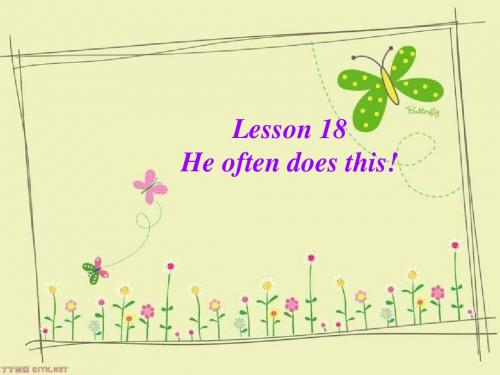
Comprehension questions
1.Where had you had lunch? 2.What did you do afterwards? 3.Had you left it on a chair or on the table? 4.Was it still there? 5.Who came in as you were looking for it?
6. ‘Did you have a good meal?’ 7. ‘Yes, thank you.’ 8. Yes, I did. 9. I hadn’t got my bag. 10. Yes, he did.
Comprehension questions
11. What did he do then? 12. How soon did he return? 13. What did he give back to you? 14. Who had taken your bag?
Lesson 18 He often dopressions
★pub n. 小酒店 n. 店主
★landlord
★bill
n. 帐单
Listen and answer
• What had happened to the writer’s bag?
• The landlord’s dog had taken the bag into the garden.
Notes on the text
• 1. look for 寻找 • 2. pay the bill 付账 • • 3. give---back 归还
• have的用法: have dinner, have a cigarette, have coffee, have a holiday, have a good time have a swim, have a rest have a pen, have a headache have做"有,患病"概念时,可作为实义动词, 也可作为非实义动词。 疑问句和否定句构成: 实义动词:通过助动词 非实义动词:直接加not • have如果一个词是以完成时态出现的,只能作 为非实义动词 .
新概念英语第二册第18课
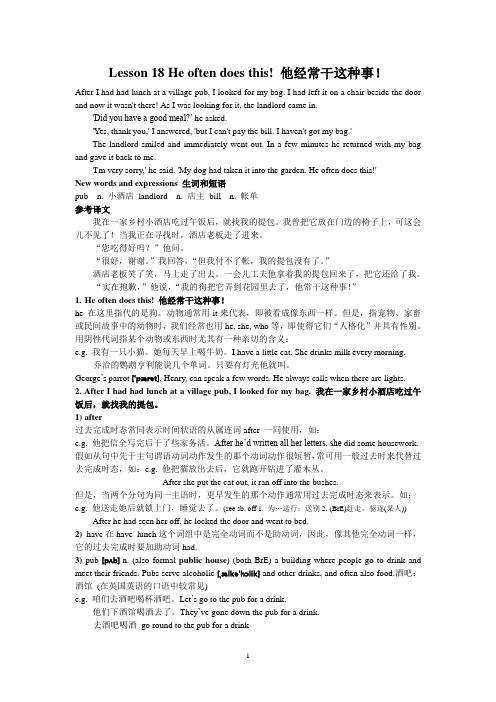
Lesson 18 He often does this! 他经常干这种事!After I had had lunch at a village pub, I looked for my bag. I had left it on a chair beside the door and now it wasn't there! As I was looking for it, the landlord came in.'Did you have a good meal?’ he asked.'Yes, thank you,' I answered, 'but I can't pay the bill. I haven't got my bag.'The landlord smiled and immediately went out. In a few minutes he returned with my bag and gave it back to me.'I'm very sorry,' he said. 'My dog had taken it into the garden. He often does this!'New words and expressions 生词和短语pub n. 小酒店landlord n. 店主bill n. 帐单参考译文我在一家乡村小酒店吃过午饭后,就找我的提包。
我曾把它放在门边的椅子上,可这会儿不见了!当我正在寻找时,酒店老板走了进来。
“您吃得好吗?”他问。
“很好,谢谢。
”我回答,“但我付不了帐,我的提包没有了。
”酒店老板笑了笑,马上走了出去。
一会儿工夫他拿着我的提包回来了,把它还给了我。
“实在抱歉,”他说,“我的狗把它弄到花园里去了,他常干这种事!”1.He often does this! 他经常干这种事!he 在这里指代的是狗。
裕兴新概念英语第二册笔记-第18课精品资料

裕兴新概念英语第二册笔记-第18课精品资料Lesson 18 He often does this他经常干这种事!What had happened to the writer's bag?After I had had lunch at a village pub, I looked for my bag. I had left it on a chair beside the door and now it wasn't there! As I was looking for it, the landlord came in.'Did you have a good meal?" he asked.'Yes, thank you,' I answered, 'but I can't pay the bill. I haven't got my bag.'The landlord smiled and immediately went out. In a few minutes he returned with my bag and gave it back to me.'I'm very sorry,' he said. 'My dog had taken in into the garden. He often does this!'参考译文我在一家乡村小酒店吃过午饭后,就找我的提包。
我曾把它放在门边的椅子上,可这会儿不见了!当我正在寻找时,酒店老板走了进来。
“您吃得好吗?”他问。
“很好,谢谢。
”我回答,“但我付不了帐,我的提包没有了。
”酒店老板笑了笑,马上走了出去。
一会儿工夫他拿着我的提包回来了,把它还给了我。
“实在抱歉,”他说,“我的狗把它弄到花园里去了,他常干这种事!”【New words and expressions】(3)1 pub [p?b] n.小酒店2 landlord ['l?ndl?:d] n.店主3 bill [bil] n.帐单一、单词讲解pub(口语)大众酒吧,酒馆go round to the pub for a drink 去酒吧喝酒pub-crawl 在数家酒馆连续喝酒public house 酒馆bar 酒吧wineshop 酒店inn 客栈,小旅馆stay at an inn/put up at an inn 住客栈landlord主人,老板,房东(旅馆,家庭,公寓)landlady 女房东,女主人n. +n.→合成n. silk+worm → silkworm 蚕blood+test → blood-test 验血adj.+n. → n.double-dealer两面派shorthand 速记v.+n. → n.pickpocket 扒手breakwater 防波堤n.+v-ing → n.handwriting 书法sun-bathing 日光浴v.+adv. → n.get-together 联欢会break-through 突破adv.+n. → n.downfall 垮台outbreak 爆发lordas drunk as a lord 酩酊大醉eg. Lord! 天啊!哎呀!哎哟!lord n. 贵族,勋爵duke [dju:k] 公爵marquis ['mɑ:kw?s, mɑ:'ki:] 侯爵earl [?:l] 伯爵viscount ['va?,ka?nt] 子爵baron ['b?r?n] 男爵sir 爵士ladyeg. Lady first. 女士优先。
新概念英语第二册第18课

He has a new house . He has got a new house.
Have 和Have got
have动词的三种用法, 作助动词,作实义动词单 用, 以及have got。 一、在英语口语中,常用have got 代替have , 作“有”解。 I have a bike. = I have got a bike. 1.其否定式为: I don’t have a bike. = I haven’t a bike. I haven’t got a bike. 2.其疑问形式为: Have you a bike? / Have you got a bike? Do you have a bike? 二、在下列情况下不能用have got来代替have。 1. 在情态动词,助动词或动词不定式之后,只能用 have,不用have got。如: May I have some more tea? 我可以再喝点茶吗? Would you like to have another apple? 你想再吃
②把人或者物留下,丢下 May I leave my shoes here ? ③听任,使处于..状态 leave sth +adj leave the door open ④on leave 休假
Key structure
他现在(已经)有一套新房子了。 He owns a new house .
Thank you !
bill(账单)
Pay the bill.(付账) 该是我付账了。 It is my turn to pay the bill. It is my turn for the bill.
leave
新概念英语第二册Lesson18

Lesson 18 He often does this! 他经常干这种事! First listen and then answer the question. What had happened to the writer's bag? After I had had lunch at a village pub, I looked for my bag. I had left it on a chair beside the door and now it wasn't there! As I was looking for it, the landlord came in. 'Did you have a good meal?" he asked. 'Yes, thank you,' I answered, 'but I can't pay the bill. I haven't got my bag.' The landlord smiled and immediately went out. In a few minutes he returned with my bag and gave it back to me. 'I'm very sorry,' he said. 'My dog had taken it into the garden. He often does this!'
新概念英语第2册课程讲义Lesson18

Lesson18单词讲解ndlord n.店主,房东,业主,老板landowner n.2.bill n.账单,单据,清单/钞票/法案/广告pay the billUS dollar billsa crime billa bill boardLesson18课文&语法讲解本课重点:have的用法实义动词助动词have的用法实义动词1.“有”2.“吃喝玩乐做”助动词have的用法实义动词1.“有”I have a book.She has a car.He had a surprise.2.“吃喝玩乐做”have a meal have breakfast have some water have fun have a good timehave a swimhave的用法实义动词助动词(完成时态中)I have received a letter.She has bought a gift.He had left.have的用法(用法不同,变否定疑问也不同)实义动词助动词(完成时态中)I have received a letter.I have not received a letter.She has bought a gift.She has not bought a gift.He had left.He had not left.have的用法(用法不同,变否定疑问也不同)实义动词I have a book.I do not have a book. She has lunch.She does not have lunch. He had a good time.He did not have a good time.助动词(完成时态中)have的用法(用法不同,变否定疑问也不同)实义动词I have a book.I do not have a book. She has lunch.She does not have lunch. He had a good time.He did not have a good time.助动词(完成时态中)I have received a letter.I have not received a letter.She has bought a gift.She has not bought a gift.He had left.He had not left.have的用法练习:(判断用法,并变否定疑问)1.You have a lot of money.2.They had a swim yesterday.3.She has eaten breakfast.4.My dog had taken it into the garden.have的用法练习:(判断用法,并变否定疑问)1.You have a lot of money.2.They had a swim yesterday.3.She has eaten breakfast.4.My dog had taken it into the garden.have的用法练习:(判断用法,并变否定疑问)1.You have a lot of money.You do not have a lot of money.2.They had a swim yesterday.They did not have a swim yesterday.3.She has eaten breakfast.She has not eaten breakfast.4.My dog had taken it into the garden.My dog had not taken it into the garden.have的用法补充两点:“有”have=have got实义动词助动词You have a lot of money.=You have got a lot of money.do not have have not got have的用法补充两点:1.“有”have=have got2.have/has had had hadI had had lunch at a village.We have had trouble with the plan.It has had no effect.1.After I had had lunch…,I looked for my bag.have的过去完成时一般过去时先后2.I had left it on a chair beside the door and now it wasn’t there!beside the doorBesides this book,I have some others.3.As I was looking for it,the landlord came in.4.“Did you have a good meal?”he asked.5.“but I can’t pay the bill.I haven’t got my bag.”6.My dog had taken it into the garden.本课重点:have的用法实义动词助动词Lesson18知识拓展本课重点:if真实条件句(假设将来)Lesson18知识拓展本课重点:have的用法实义动词助动词have的用法实义动词“有”“吃喝玩乐做”助动词(完成时态中)have的用法He had a smoke after dinner.My friend Bill has had a headache.have的用法Their guest room has two big windows.We had had a long vacation after that.本课重点:have的用法实义动词助动词。
新概念英语第二册课件Lesson18(共14页)
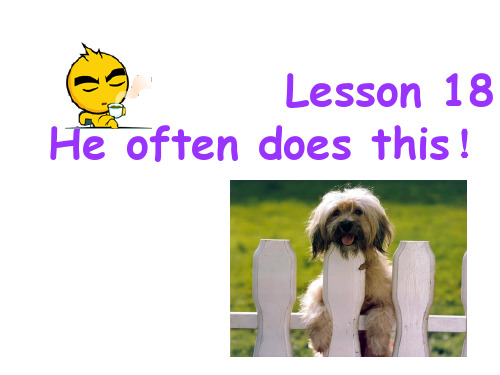
New words and expressions
public house 我们去酒吧喝一杯吧!
Let’s go to the pub for a drink!
landlord ['lændlɔ:d] n. 店主,地主
3. She couldn't pay the bill. 4. The landlord soon found it for her. 5. His dog had taken it into the garden.
1. What happened to the bag?
writer’s
After I had had lunch at a village pub, I looked for my bag.
1. look for 寻找 look after =
take care of 照看 照顾 look out
我要当地主!
I want to become a landlord !
bill [bil] n. 账单,比尔
比尔会替我买单的。 Bill will pay the bill for me.
What do you keep as a pet?
•
Dogs
•
listen to the tape and answer the question:
7. give back归还 give 用法(难点P82) give in 上交,呈交 屈服,让步,投降 gave away 赠送
give up doing sth. 放弃,抛弃 give up 交出,让出
'I'm very sorry,' he said. 'My dog had taken it in into the garden. He often
新概念英语第二册 lesson 18 绝对实用

Let’s play a guessing game.(animal) 1.It runs very fast, people used it as a traffic tool in the old days.
horse
2.It’s very clever, it likes eating peaches, and it’s good at climbing trees.
After --- lunch --- look for – had left it – and now--- looking for–
landlord
good meal – yes– can’t pay– haven’t got Smiled --went out – in a few minutes– returned – gave back – sorry – taken
it into – often
e.g.: 我们去酒吧pub for a drink!
landlord ['læ ndlɔ:d] n. 店主,地主
我要当地主!
I want to become a landl
bill [bil] n. 账单,比尔
Bill will pay the bill for me. 比尔会替我买单的。
Everyday English
1. It’s terrible! 太糟糕了!/ 太可怕了! 2. Give me a break! 饶了我吧! 3. I can’t help it! 我情不自禁!
Everyday English
1. Catch you later, buddy! 稍后联系你,兄弟! 2. Between us! 你知,我知 3. Watch your mouth. 注意言辞
新概念第二册Lesson 18知识要点总结

新概念第二册Lesson 18复习要点一.L18词汇讲解:1.pub 小酒店bar 酒吧book bar 书吧/tea bar 茶吧/ internet bar 网吧ndlord 店主land 土地lord 领主Lord of Ring 指环王3.bill 账单pay the bill 付账Bill,please./Check, please.结账。
二.重难点:1.have got/has got 有/得了某种疾病,当have 或者has 的意思是“有,得病”的使用,可以互换2.give up 放弃,投降give in 投降/上交give away 送人区分give in 和give up 的不同:The soldiers lost the battle but they didn’t give themselves up . 士兵们输掉了战斗,但是他们没有投降。
The soldiers didn’t give in.士兵们没有投降。
3.a village pun 村庄的小酒馆an apple tree 一棵苹果树a woman doctor 一位女医生注意:two apple trees /two women doctors4.look for 强调动作或者过程find强调结果类比:look at/see listen to/hear put on/wear。
5.leave sb. sth/leave sth. for sb.给某人留下某物6.return的含义返回:He’ll return to his country in 2 years.他两年之后会回来。
返还,偿还:I’ll return your money soon.我会很快还你的钱。
7.几个“除......之外”的词和短语:besides/except/apart from/except fromapart from和except for 可用于句首。
新概念第二册第18课学习资料
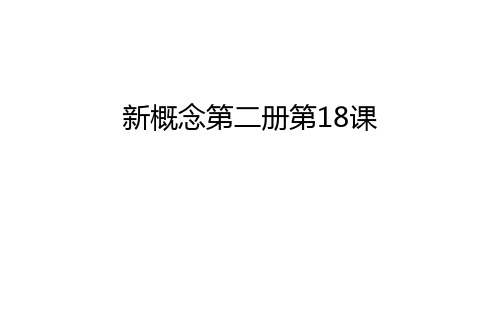
In a few minutes he returned with my bag and gave it back to me.
in+ 时间段 “多长时间以后” in a few minutes in a few ቤተ መጻሕፍቲ ባይዱays in a few weeks in a few months in a few years
“Did you have a good meal?” he asked “Yes, thank you,” I answered, “but I can’t pay for the bill. I haven’t got my bag.” The landlord smiled and immediately went out. In a few minutes he returned with my bag and gave it back to me. “I’m very sorry,” he said. “My dog had take it into the garden. He often does this!”
He often does this. He/she都可用来指Pets
I looked for my bag。
look for “寻找”(强调找的过程) Find “找到”, 强调寻找的结果。
e.g.我在寻找一个快速致富的方法。
I’m looking for a way to get rich
quickly.
---Can you find a football in our classroom? ---We are looking for it.
I had left it on a chair beside the door.
新概念英语第二册Lesson18Heoftendoesthis!讲义

新概念英语第二册Lesson 18He often does this!他经常干这种事!After I had had lunch at a village pub, I looked for my bag. I had left it on a chair beside the door and now it wasnt there! As I was looking for it, the landlord came in. "Did you have a good meal?" he asked. "Yes, thank you, "I answered," but I cant pay the bill. I haven‘t got my bag." The landlord smiled and immediately went out. In a few minutes he returned with my bag and gave it back to me."I’m very sorry," he said. “ My dog had taken it into the garden. He often does this!”【课文翻译】After I had had lunch at a village pub, I looked for my bag.我在一家乡村小酒店吃过午饭后,就找我的提包。
I had left it on a chair beside the door and now it wasnt there!我曾把它放在门边的椅子上,可这会儿不见了!As I was looking for it, the landlord came in.当我正在寻找时,酒店老板走了进来。
Did you have a good meal?" he asked.“您吃得好吗?”他问。
新概念第二册Lesson18笔记整理

Lesson 18 He often does this!一、Grammar:have用法Have:助动词:构成各种完成时(现在、过去、将来)和完成进行时;have/has done; had done; will/shall done实义动词:1、表示“具有”、“拥有”时为状态动词,与have got可互换,一般不用于进行时或被动语态。
2、表示eat、drink、enjoy、take等意思时,可用于各种时态。
Eg:have lunch;have a cup of coffee;have a good time;have a bath对以上各种完成时举例:现在完成时:He has just gone to Beijing.过去完成时:The film had begun before we got to the cinema.将来完成时:By the time you get home I will have cleaned the house from top to bottom. (注:将来完成时表示将来某一时间以前已经完成的动作,并对将来产生影响。
一般它的时间状语为:before/by+将来时间;by the time引导从句)二、课文语言点:1、look for:表示动作,不涉及结果;find:表示结果2、leave:1)离开:leave for+地点:动身去某地;leave+地点+for+地点:离开某地去某地2)遗弃: Her husband has left her. 她的丈夫把她遗弃了。
3)遗忘,丢下:I left my keys at home.4)留给,遗留:The famous actress left all her money to charity.(慈善机构)5)让某物处于某种状态:He left the window open. 他让窗户开着。
3、beside:只作介词,“在旁边”=next to(旁边,紧挨着)Eg:There is a boy beside near the door. 有个男孩在门的旁边。
新概念英语2_第18课
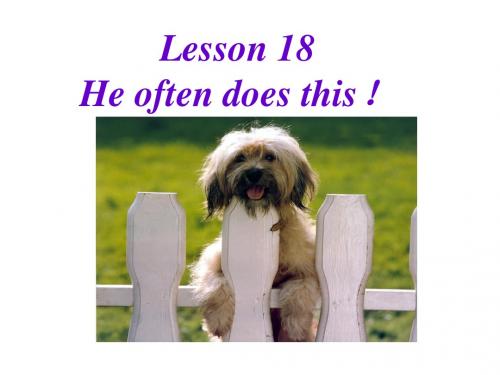
3.have可译为“拥有”=have got.但have got常用于一般现 在时,其他时态中用have. 在英式英语中,have用法与be相同,即可以不用助动词 do/does/did进行否定和疑问。 Eg: He has a pen.—He hasn’t a pen.—Has he a pen?— Yes ,he has.—No, he hasn’t.
The landlord smiled and immediately went out. In a few minutes he returned with my bag and gave it back to me. ‘I'm very sorry,’ he said. ‘My dog had taken it into the garden. He often does this!’ 1. immediately 立刻,马上 同义词:at once, instantly, right away, straight away 2. in a few minutes 几分钟后 类似的说法: in a few days in a few weeks in a few months in a few years
I had left it on a chair beside the door and now it wasn’t there! 1.leave ---left---left a.离开,出发 leave sp离开某地 leave for sp出发去某地 Eg:他要离开重庆。 He will leave Chongqing. 他要出发去重庆。 He will leave for Chongqing. b.把(人、物)留下、丢下、遗留等。 Eg: Have you left anything in the car? 2. beside: prep.在…旁边 Eg:他的汽车正停在那辆卡车的旁边。 His car is parking beside the truck.
新概念英语 第二册 lesson 18
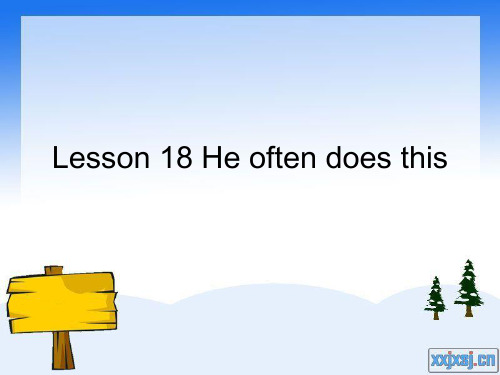
• After I had had lunch at a village pub, I looked for my bag. I had left it on a chair beside the door and now it wasn't there! As I was looking for it, the landlord came in. • 'Did you have a good meal?" he asked. • 'Yes, thank you,' I answered, 'but I can't pay the bill. I haven't got my bag.' • The landlord smiled and immediately went out. In a few minutes he returned with my bag and gave it back to me. • 'I'm very sorry,' he said. 'My dog had taken in into the garden. He often does this!'
Lesson 18 He often does this
lord
• • • • • • [n]上帝,主,贵族 as drunk as a lord 酩酊大醉 Lord !天啊! landlord [n]店主 landlady [n]女店主 pub 小酒店 inn 客栈,小旅馆
新概念英语-第二册18课

bill [bɪl]
①账单、纸币 pay the bill 付账 eg. It’s wrong to leave a hotel without paying your bills. Bill please ! 买单 ②招贴,广告牌 a movie bill 电影海报 NO bills !禁止张贴
1.Dirty 2.Waste time and money 3.Carry some disease
When we talk about a dog , what words will you use?
• • • • •
Lord [n]上帝,主,贵族 as drunk as a lord 酩酊大醉 Lord !天啊! landlord [n]店主 landlady [n]女店 主 • pub 小酒店 • inn 客栈,小旅馆
give back 归还 give it back to me.
give in 屈服 eg. The enemy have given in to our army. Don’t give in yourself to the difficulties. give in 上交,呈交 give in your homework.
eg. He took a bath while I was watching TV.
He watched TV while he was eating . He watched TV while eating .
give 及物动词,后接名词作宾语。常表示“给予”“交给” eg. Give me the book.
Homework
• 背单词 和课文 • 掌握所有讲过的知识点。
give away 捐赠,赠送 eg. He gave away all his money to the society. give up 放弃, 抛弃 eg. Never give up, you will finally succeed. Lucy’s father gives up smoking. (give up doing)
- 1、下载文档前请自行甄别文档内容的完整性,平台不提供额外的编辑、内容补充、找答案等附加服务。
- 2、"仅部分预览"的文档,不可在线预览部分如存在完整性等问题,可反馈申请退款(可完整预览的文档不适用该条件!)。
- 3、如文档侵犯您的权益,请联系客服反馈,我们会尽快为您处理(人工客服工作时间:9:00-18:30)。
1、secretary 2、traffic 3、interrupt 4、 ticket 5、note 6、 area 7、sign 8、 reminder 9、fail 10、 obey 11、 a polite request 12、feel nervous 13、can not afford to pay such large salaries 14、in a weak voice 15、No parking 16、good news 17、look up from 18、a thousand pounds 19、 Welcome you to our city. 20、 He said that business
6. -________I have your English name,please?
-Yes,Helen. H-E-L-E-N. A. Must B. May C. Will D. Need 7. -Who is the boy over there?Is it John? -No,it ________ be him. John is much taller. A. mustn't B. may not C. can't D. needn't 8. -Can you play it ,Jay? -Yes,I ________. It's easy. A. must B. can C. need D. may 9.-You must come back every month. -Yes, I ________. A. will B. must C. should D. can 10. She ________ know the answer. but I'm not sure. A. maybe B. may be C. may D. must
酒馆
at pub
我们去酒吧喝一杯吧! Let’s go to the pub for a drink!
pub club bar的区别
pub是专门酒店(一般带有西方风格) club专指有会员的俱乐部
bar形式多样,可以是咖啡吧,酒吧或
水吧
landlord ['lændlɔ:d]
n. 店主,地主,房东
A. Shall B. Will C. Must D. Can 3. -Can you go skating with us this afternoon? -Sorry,I can't. I ________ take care of my little sister at home. A. can B. may C. would D. have to 4. -Must I hand in my exercise book today? -No ,you ________. A. can't B. needn't C. mustn‘t D. won't 5. -May I have a word with you? -No,you ________. I'm busy today. A. needn't B. wouldn't C. don't have to D. can't
1、秘书 2、交通 3、插话,打断 4、交 通违规罚款单 5、 便条 6、 地段 7、 指示牌 8、 提示 9、 无视,失败 10、 服从 11、 一个有礼貌的请求 12、 感到 很紧张 13、 不能支付这么庞大的工资开 支 14、 用微弱的声音说 15、禁止停车 16、 好消息 17、 从···抬头看 18、 一千英磅 19、 欢迎你来到我们的城市 20、 他说生 意非常不景气。
was very bad.
1. -Mum,may I watch TV now? -Sure,but you ________ help me with my English.
A. can B. may C. must D. could 2. -________ I download the article again? -No ,you needn't.
He often does tn, mountain, river, tower,
building.
[pʌb] ['lændlɔ:d]
pub landlord
[bil]
bill
New words
pub [pʌb]
n. 小酒店
public house
landlady
女房东 我要当地主!
I want to be a landlord !
bill [bil] n. 账单,比尔
Bill will pay the bill for me. 比尔会替我买单的。
What we have learnt ,do you kown ?
pub [pʌb] n. 小酒店
新概念二册第18课
1、captain 2、 sail 3、 harbour 4、 important 5、 performance 6、 occasion 7、neighbour 8、 at present 9、 the Workers’ Club 10、as usual 11、 try to keep order 12、good luck 13、pop singer 14、 early in the morning 15、take part in the race across the Atlantic 16、 set out 17、 plenty of time 18、 say goodbye to sb. 19、be proud of 20、He will be away for two months.
landlord ['lændlɔ:d]n. 店主,地主
bill
[bil] n. 账单,比尔
He 指宠物、she 山川、湖泊、国家、建筑
Have 三种常见用法
As….. , …. 正当…的时候,…发生了
